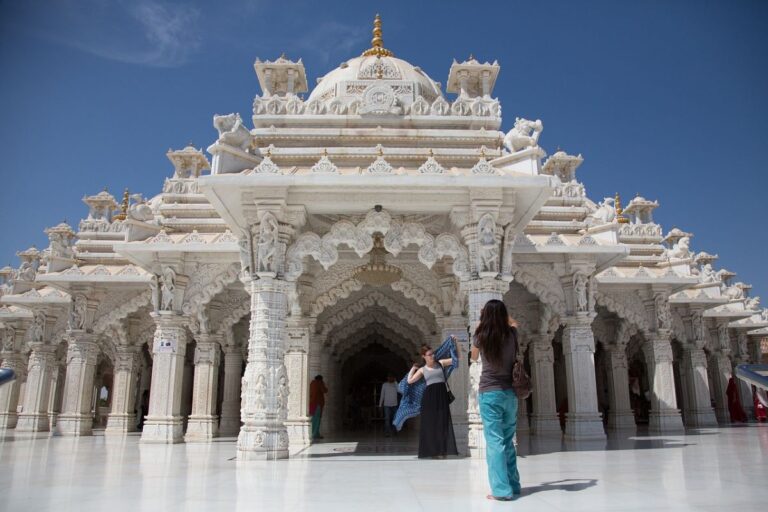Take Skift
Earlier this year, the Indian government increased the tourism budget for development, but cut the allocation for global promotion by 97%. Now, with the final budget fast approaching, the sector is hoping for a more meaningful solution to its problems.
Bulbul Dhawan
In February, the Indian government had allocated INR 24.5 billion (USD 293 million) for the tourism sector as part of the interim budget, a slight increase from the initial allocation of INR 24 billion (USD 290 million) last year.
But the Union budget also cut the global promotion allocation by 97% to just INR 30 million ($361,000).
The cut comes as major efforts have been made to modernise and develop destinations across the country and travel is a significant part of the Indian economy: a total contribution of around $200 billion, or just over 6% of the country’s GDP, according to the India Brand Equity Foundation (IBEF). The government wants to increase this contribution to 10%.
The recent elections saw Modi return to the prime minister’s post, but the ruling government is a coalition whose budget is due later this month.
Skift spoke with travel industry executives to get a better understanding of what they expect from the budget and government policy:
They want “industry status”
Travel companies have long sought “industry status” for tourism, a state-level recognition that allows for better property tax calculations, land allocation advantages, energy costs and other government benefits.
Some states have already granted industrial status, including Assam, Rajasthan, Uttar Pradesh and Gujarat, but the hope is that the status will be broader.
“Recognizing tourism as a sustainable driver of economic growth and development, it is imperative to accord industry status to the travel and tourism sector, which will help in regularizing policies and processes,” said Amit Jain, Founder, MagicFares travel agency.
GST: a single rate for hotel taxes
Currently, hotel rooms are taxed on a staggered basis under the Goods and Services Tax (GST) regime.
“The tiered GST based on hotel room rates can lead to price disparities as hotels adjust room rates based on demand and peak season rates. For example, a room rate costing INR 10,000 ($120) attracts a GST rate of 18%, while an off-season rate of INR 7,000 ($84) attracts a GST rate of 12%. We urge the government to consider a uniform GST rate of 12% for hotels,” said Rajesh Magow, Co-Founder and Group CEO, MakeMyTrip.
The Hotel Association of India (HAI) has also demanded a reduction in the GST rate from the current 18%.
Simplified registrations for OTAs
According to Magow, online travel companies in the country are facing difficulties in obtaining the required registrations under the GST regime.
“Current regulations require OTAs to establish a physical presence in each state, even when it is not required, which results in high administrative costs. Allowing OTAs to register in states through their central headquarters would significantly alleviate these burdens, streamline operations and improve efficiency. In addition, this requirement puts domestic OTAs at a disadvantage compared to their international competitors that are not subject to similar regulations,” he said.
Magow also called for the elimination of disparities between e-commerce operators and e-commerce suppliers in the domestic market. “Currently, a customer pays a 5% goods and services tax when booking a non-air-conditioned bus through an e-commerce platform. This fee is zero for a direct booking with the bus operator, whether it is made online or offline.”
State of infrastructure for hotels
The hospitality sector often complains about high taxes and onerous and cumbersome licensing rules. The infrastructure status for hotels will allow them to access more flexible financing at more favourable interest rates and with longer repayment periods, thus attracting investment.
“The hospitality sector is a capital intensive sector that requires substantial investments. Our long-standing demand for infrastructure status and sector benefits at the state level will provide benefits such as lower utility rates, reduced property taxes, easier access to finance and more favourable loans. These are essential to reduce the cost of doing business and ensure the long-term viability of the sector,” said Sanjay Sethi, Managing Director and CEO, Chalet Hotels Limited.
Strengthening sustainability
Popular tourist destinations are overcrowded across the country, prompting Tamil Nadu, Madhya Pradesh and Uttarakhand to consider measures to curb the problem.
Magow urged the government to encourage businesses to invest in the development and improvement of tourist destinations as part of a corporate social responsibility (CSR) initiative.
“A weighted deduction of income tax and GST on CSR funds deployed for improving tourism destinations will attract greater private sector participation. Such a symbiotic relationship not only helps in preserving tourist sites but also ensures sustainable development at all levels,” he said.
He also called for tax incentives for hotels and homestays adopting sustainable practices in line with the United Nations Sustainable Development Goals, particularly SDG 11 (Sustainable Cities and Communities) and SDG 13 (Climate Action).


